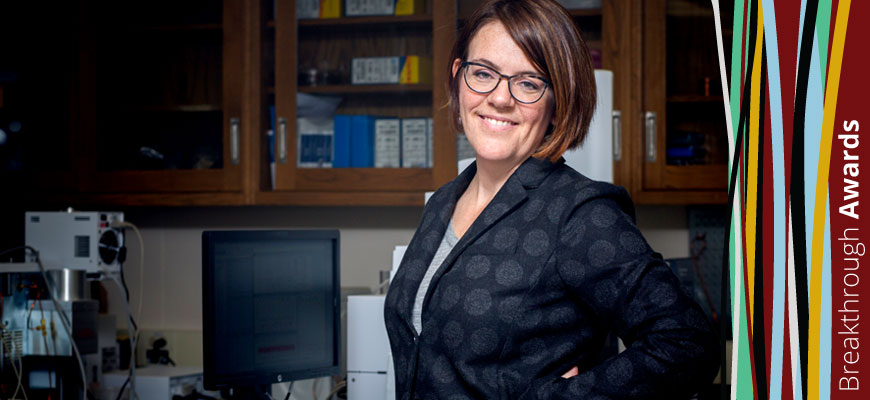
Going to extremes
Earth sciences researcher studies life in Antarctica to understand life on other planets
Posted on: April 14, 2017; Updated on: April 14, 2017
By Melinda Waldrop, melwal@mailbox.sc.edu, 803-77-3685
The things Lori Ziolkowski discovers at the edge of Antarctica might one day provide a detailed roadmap to assist explorers probing for life on Mars.
Ziolkowski, an assistant professor in Carolina’s earth and ocean sciences department, spent a month this winter at an isolated Belgian research station, searching for signs of microbial life.
“It’s what some might call astrobiology,” she says. “If we’re going to look for life on other planets, we can send rovers there, but the rovers are limited by payload or weight. So we can also study extreme places on Earth, to figure out if there could be life.”
Ziolkowski and fellow scientists trekked an hour and half each day to the research site. They collected rock and ice samples to analyze at their labs in an effort to answer a simple question: “Basically, do bugs — microbes — live in Antarctica?” Ziolkowski says. The team chemically extracted microbes and used a carbon dating technique “to look at how old the carbon is that’s in the microbes,” Ziolkowski says. “That’s one way in which we can understand how quickly they cycle, which will help us understand how much of a thriving community they are.
“It just helps us understand more about where to look for life on Mars.”
Ziolkowski’s work at Princess Elisabeth Station is funded by the Baillet Latour Fellowship she received last fall from the International Polar Foundation, an award given every two years and traditionally dominated by European recipients.
It makes me feel like I’m doing something worthwhile in the grand scheme of things.
Lori Ziolkowski
Ziolkowski, a native Canadian who’s been at the College of Arts and Sciences since 2013, specializes in radiocarbon dating compounds to address pressing environmental concerns, such as whether thawing permafrost contributes to more greenhouse gases in the atmosphere. Her study of carbon cycling by microbes years after the Deepwater Horizon oil spill showed those microbes are, in fact, eating the remnants of the oil — a finding with significant ramifications for pollution remediation efforts.
Ziolkowski, who has published eight papers and co-authored another 13, compares her varied research subjects to a bag of M&Ms.
“You have a yellow bag and it’s filled with different-colored candies,” she says. “If you radiocarbon date the bag, you’re going to get a mixture of everything. In my lab, what we can do is isolate just the blue candies from the red candies and radiocarbon date those specific compounds.”
Ziolkowski obtained her Ph.D. from the University of California Irvine in 2009. Her work has taken her to Alaska for the past three summers, where she’s climbed glaciers to investigate what is causing a darkening that decreases reflectivity, accelerating melting and, therefore, sea level rise. In the next few years, she’ll continue those efforts in Greenland.
“I’m motivated by the implications for climate change, but also, who gets to do a job where you’re doing something that’s fun and adventurous but also helping understand what’s going to happen in the future?” she says. “It makes me feel like I’m doing something worthwhile in the grand scheme of things.”
Share this Story! Let friends in your social network know what you are reading about